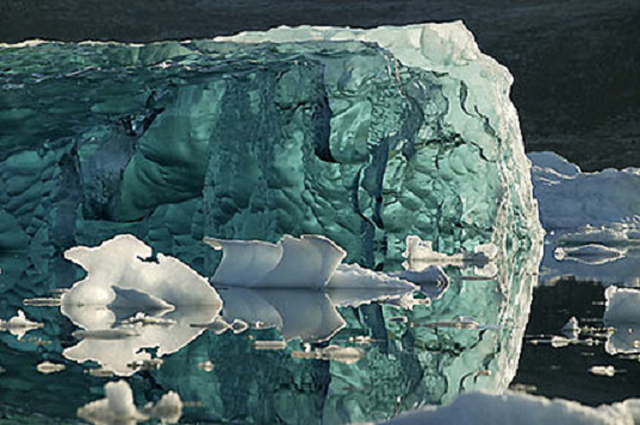Feb 22, 2026
Feb 22, 2026

However, the Arctic is no longer able to hide the dark shadows that loom ominously over it. The Arctic way of life is under threat from the vast untapped oil and gas reserves to the industrial and agricultural chemicals that travel carelessly via air and water currents of this once pristine land. But, it is the region's vulnerability to global warming or, as it is more broadly termed "climate change,” that has brought the most attention. For it is here that scientist believe that the detrimental impact of climate change is unfolding silently.
The grim predictions for the Arctic are well documented in the several studies done by researchers over the years. The Arctic Climate Impact Assessment in November 2004 was one such comprehensive and independent study that concluded that almost half the Arctic sea ice would melt by the end of the century, bringing a dreadful fate for Polar people and animals alike. The resonations of Arctic’s changing world would be heard as far away as Florida and Louisiana as rising sea levels threaten floods across the low-lying coastal areas. In 2005, scientist aboard the Greenpeace ship Arctic Sunrise found new disturbing evidence that Greenland's glaciers were melting at an unprecedented rate. According to Greenpeace, "Greenland's massive ice sheet locks up more than six per cent of the world's fresh water supply, and if it were to melt completely, it would cause sea levels around the globe to rise by nearly 20 feet.” But as Greenpeace campaigner onboard the Arctic Sunrise Melanie Duchin puts it bluntly: "The alarm is now deafening. We can't stand back and watch our future go under, literally.” In 2008, reports by scientists from the University of Colorado at Boulder's National Snow and Ice Data Centre found that in the 30 years since records of the Arctic sea ice began to be kept the ice had shrunk to its lowest level. The European Space Agency's satellite images further showed the Arctic sea ice coverage decreasing enough to open the historically impassable sea route of the Northwest Passage for the first time since records began in 1978.
In 2007, the scientist gathered at the Geophysical Union meeting believed that in the next six years we might actually see the summer sea ice in the Arctic totally disappear. Neil Hamilton, director of the WWF International Arctic Programme, urged international policymakers' meeting at the Bali Goblal Warming Seminar that: "This unsettling news is the most compelling argument for deep cuts to emissions, now.” He realistically stated that while time may have run out to avoid an Arctic meltdown, it was essential that the world understand that what happened in the Arctic would affect us all. Already the WWF is concerned that the Arctic is on course to disappear entirely by the end of the century with its research showing that "perennial Arctic ice is melting by nearly 10 per cent a decade'. So, as Tonje Folkestad, Climate Change officer at the WWF Arctic Programme, says, "Unless we act immediately to cut Carbon emissions, some parts of the Arctic will soon become unrecognizable.”
The scientific research on the Arctic is important as agencies like The National Oceanic and Atmospheric Administration provide a crucial window to the depth of the problem through regular comprehensive studies and information. However, the work being done by organizations such as WWF (formerly known as the World Wildlife Fund) is just as important in the effort to preserve the Arctic. Since 1992, through its International Arctic Programme, the WWF has been working with partners across the region to preserve its rich biodiversity in a sustainable way. The programme has successfully provided current and dependable information through field-based projects to initiate better policies and actions to combat climate change effectively.
The WWF is contributing to the activities of the Circumarctic Protected Areas Network and Arctic Climate Impact Assessment in developing as well as implementing adaptation strategies for species, ecosystems, and cultures in coping with a changing climate in the Arctic. The other interesting programme sponsored by the WWF is the Climate Witness Projects that is seen as a platform for people to not only tell their stories about how they are experiencing the changes in climate but also what it means to them.
Presently, Greenpeace among others are working tirelessly to preserve what is left of the Arctic. One of the initiatives being undertaken is the idea of designating the region as a World Park, including a marine reserve through the "Hands of the Arctic” petition urging people to come forward and be heard.
Unfortunately, the political and military jockeying for control of the far north continues as the ice melts away. The lack of political will compounded by indifference will push the Artic to be lost in the pages of books as there will be no second chance to undo the past. While the controversy over the accuracy of climate science remains debatable and skeptics try and take centre stage to dismiss global warming theories as being alarmist, the question is no longer about the future as we are confronted with the challenges posed by a changing Artic in the present.
The projections thus far for the region are bleak and almost disheartening. And while many more environmental groups, individuals and organizations work to make a positive impact in the Artic, there is little time with so much more that still needs to be done. And while you contemplate which side of the climate change debate you belong to, take a moment to close your eyes and envision the Arctic whose fate is entwined with your own survival. A place where nature's beauty holds on stubbornly, waiting for the world to wake up and face the harsh reality of climate change.
19-Apr-2010
More by : Fatima Chowdhury